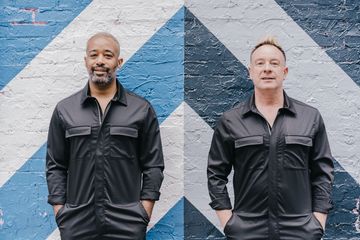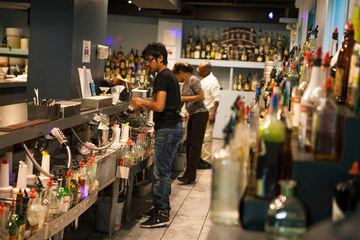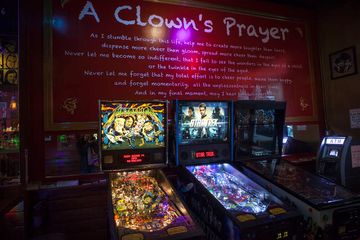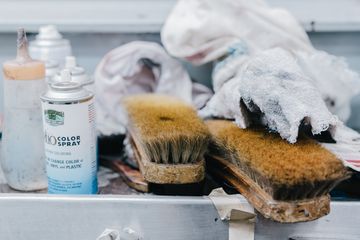Maison 10, an exciting and innovative gallery and boutique project from the minds of co-founders Tom Blackie, Henri Myers, and Carsten Klein, opened in June 2016. For the trio of founders, ten is the magic number, as the space operates in ten-week cycles, each centered on ten featured works by a particular artist, alongside ten different product categories, each with ten carefully selected items. Customers can also choose one of ten different charities to which ten percent of the proceeds of their purchase will be donated. Maison 10 combines the founders’ shared love of art, culture, and philanthropy. Despite its bare bones appearance, the storefront is bound to catch the pedestrian eye, or perhaps first their nose with sage burning out front. When Manhattan Sideways stopped by, the wall on the side of the building featured a striped mural, which we learned is repainted every ten weeks by the newest featured artist. The shop is minimally decorated with white display tables showcasing a colorful array of products. It is clear that the room is meant to be rearranged every ten weeks, and that the items on display speak for themselves. The window display rotates even more frequently, changing daily at four pm. “It’s all about engaging with customers. We like to keep it fresh, and the opposite of formulaic, ” Tom remarked with a laugh. The only constant presence in the store is the large statue of a gorilla sitting in the back corner, overseeing the boutique. The founders’ wide range of backgrounds and experiences give Maison 10 the worldly quality it effortlessly seems to possess. Henri, who is originally from New York but has spent quality time in Los Angeles, has spent most of his professional career working in fashion marketing and branding development, attending trade shows, and cultivating a keen sense of taste. Tom, who hails from Scotland, cut his teeth working in the London non-profit sector, learning the intricacies of how charitable institutions operate. Carsten, who is of German origin, is the visual thinker of the group, working mostly in typography, packaging, interior and web design. The three have each made New York their home and describe their shop as “a mixture of all our worlds put together. ” By combining their skills of curation, altruism, and design, these men have created a space dedicated to ethical consumerism. So, why ten? In addition to being a good number for design and numerology, ten has a nostalgic connection for the team. “When all three of us were teens, growing up in our different cities, we were music freaks, and we would run to the record stores every week to keep track of the top ten charts, ” Henri recalled. Similarly, the diverse selection of gifts, fine art, and lifestyle items ranging from candles and books to handmade jewelry appears to be the best of the best. “With only ten categories and ten products, we’ve already pre-selected the best items, and they all have a story, ” Henri noted as he moved between a fruit bowl made from copper and walnuts to a bag made from authentic Japanese satin. “It mostly comes down to personal taste. These are the things we love and feel should be on everyone’s radar. It’s about introducing the customer to an experience one on one. We want to bring back shopping. ” Henri mentioned how important it is that Maison 10 offers products at a wide range of prices, so as not to alienate any potential customers, “We wanted to make it so that you could come in and find a $15 book, a $600 bag, or even a $7, 000 piece of art. ”Nine out of the ten charitable organizations to which the men donate remain fixed throughout the year. The tenth changes with the cycle and is chosen by the designer. The fixed charities are mostly found through personal connections thanks to Tom’s work experience in the non-profit world, and thus are largely New York- and London-based. The impressive list contains local favorites like Housing Works, which is dedicated to fighting the dual crises of homelessness and AIDS, and SAGE, which supports LGBT elderly nationwide. There are also world humanitarian causes including Orange Babies, an Amsterdam-based organization that advocates for HIV positive pregnant women throughout Africa. The Manhattan Sideways team visited right around the first anniversary of Maison 10's opening, and Tom was pleased to report that the business was doing well after its first year. “It keeps getting busier and busier; people love the concept and we’ve definitely gained some super fans who come in every two or three days. " The founders told us that many people who live in the vicinity come in on a regular basis to introduce the shop to their friends. The men are thrilled that they are on their way to becoming a "strong community" - "We believe in our project and we believe that it’s good for the street too. ” They have already collaborated with their neighbors, such as Yeohlee Teng, whose work was featured during a cycle. The team is also working directly with designers on future products, including an original fragrance by Henri himself. Events are a regular part of Maison 10's cyclical process, with launch and closing parties every ten weeks that boast several hundred guests over the course of the night. Additionally, the shop hosts “Friday Night Live” which features five of the designers and five display islands organized by category. These provide an opportunity for customers to interact with the artist or designer, adding a personal touch to the consumer experience. At each of these events, Tom, Henri, and Carsten can be seen in their signature black jumpsuits.




